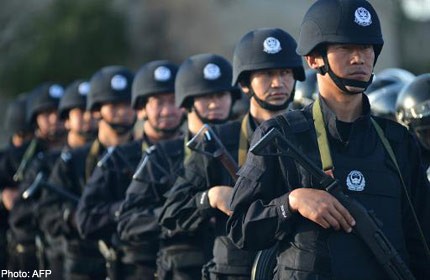Eight police station 'attackers' shot dead in China's Xinjiang: govt

BEIJING - Eight "attackers" armed with knives and explosives were killed Monday during a "terrorist attack" on a police station in China's Xinjiang according to authorities, the latest deadly incident in the largely Muslim region.
One of the attackers was held in the clash in Shache county, said the official website of the government of Xinjiang, where mainly Muslim Uighurs are the largest ethnic group.
The website, which called it a "terrorist attack" said: "Police took decisive action, shooting eight people and arresting one." Officials were investigating, it added.
The area, around 200 kilometres (124 miles) south-east of Kashgar, is known as Yarkand in the Uighur language.
China's foreign ministry spokesman Qin Gang called it a "violent terrorist attack".
"It testifies once again to the anti-society and anti-human nature of the three evil forces, and they have caused great damage to the state, the society and the people," he said at a regular briefing.
Beijing refers to what it calls ethnic separatism, religious extremism and terrorism as the "three evil forces".
Authorities have blamed "terrorists" for a series of similar attacks this year in Xinjiang, a sprawling and resource-rich region four times the size of Japan and rich in oil and natural gas.
Rights groups and outside scholars, however, say unrest is spawned by cultural oppression, intrusive security measures and a wave of immigration by China's Han majority.
"Directly shooting to death protesters accused of so-called terror is... the latest means to suppress Uighurs," said Dilxat Raxit, a spokesman for exile group the World Uyghur Congress (WUC).
"Uighurs are enduring Chinese discrimination and humiliation," he added in an email.
Government economic policies aimed at developing the region have raised Uighur living standards, though Han dominance of the economy has helped foster continued resentment.
Xinjiang has seen regular violent incidents this year, including one in the Turpan area that left 35 people dead in June.
The latest violence came after 16 people, including two police officers, were killed in a clash near the Silk Road city of Kashgar earlier this month, when authorities said that "thugs" armed with explosive devices and knives attacked police attempting to detain them.
The WUC described that incident as a "massacre" of a family preparing for a forthcoming wedding.
In late October, police said three Xinjiang Uighurs drove a vehicle into crowds of tourists opposite Beijing's Tiananmen Square - the symbolic heart of the Chinese state - killing two people and injuring 40, before crashing outside the Forbidden City and setting their vehicle ablaze.
All three attackers, described as a man, his wife and his mother, died.
Beijing described the assault, the first blamed on Uighurs outside Xinjiang, as "terrorism" and said separatists backed by the militant East Turkestan Islamic Movement were responsible.
In the worst outbreak of sectarian violence in recent years in China, around 200 people died and more than 1,600 were injured while hundreds were arrested in riots in the Xinjiang regional capital Urumqi in July 2009.
Nicholas Dynon, who researches Chinese media and propaganda at Macquarie University in Sydney, stressed that analysing the causes and effects of violence in Xinjiang was never easy given the difficulty of obtaining independent and unbiased information from the region.
But coverage in state-run media had increased, he said, amid a broader crackdown by new President Xi Jinping on a range of issues in China, although Xinjiang itself had seen far more violent periods in the past.
"I don't think there is necessarily a causal relationship between the recent crackdowns and higher rate of violent attacks in Xinjiang," he told AFP.
But he added: "I do believe there is a direct relationship between the crackdowns and higher rates of openness in reporting on events occurring in Xinjiang this year."